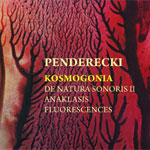
Krzysztof Penderecki - Kosmogonia [Cold Spring - 2017] |
A surprising foray for Cold Spring into the realm of modern classical music. Krzysztof Penderecki is less known in Western Europe compared to other doyens of the high avant-garde such as Cage, Ligeti, Stockhausen and Xenakis but these early works - of which four instances are showcased here - stands up well against them. All compositions are performed by the chorus and symphony orchestra of the National Philharmonic Warsaw. Film soundtrack buffs may be familiar with Penderecki's work used in The Shining and David Lynch's Inland Empire.
The label blurb appears to be making an appeal to their audience by describing the first piece presented here, Kosmogonia, as "some of the darkest music ever composed". In fact it's a hugely ambitious modernist space opera on the theme of human history and Progress (yes, with a capital P). Written for the 25th anniversary of the UN and drawing a conceptual line from the book of Genesis to the space race, it's scored for several voices, including mixed chorus and a percussion and brass heavy orchestra. In the first section the dramatic power of the percussion and brass seem at times to be stalking the strings which respond by calling forth the chorus, but to no avail. The human element, whether the tenor or soprano seem constantly trying to stay ahead of Penderecki's innovative use of tone clusters, stabs of atonal dissonance and clever percussive combinations. The singers quote from Scripture, medieval authors and even American astronauts. The overall feeling is a fascinating duel between mans ambitions and his limitations in the face of the vastness of space and time. It's perhaps not a coincidence that after this piece was completed the Polish composer began a more conservative turn, both musically and personally, rejecting the avant-garde's constant striving toward destructive innovation and forging a more melodic, introspective path replete with more overt religiosity.
De Natura Sonoris II is perhaps the most "hardcore" modernist piece here which both in composition and title bares comparison with works by Xenakis such as Metastasis, Pithoprakta, or even the electro-acoustic Diamorphoses. The Polish composer's clever use of tonal clusters and "swarm" like effects compete well with the latter piece's tape manipulated strings and sonorous objects. Anaklasis is the shortest of the four compositions and consists of three tense and tightly scored sections each emphasising a different aspect of its principle instrumental components. The second section's striking use of tam-tams and celesta are of particular interest. Around the end of this section you get something of the fracturing effect that the piece's title suggests as the strings separate into a range of different tones grouped around the same note. Insect like in its layering of tone upon tone the piece ends with a strange coda of celesta and plucked piano strings.
The final piece is the seventeen minute long Flourescences. Like Kosmogonia it's epic in scale and built from a number of interlinked sections showcasing the composers innovative use of tone colour and textural possibilities. The siren is the focal point of the opening section, drawing the strings with it in a chaotic whirl of sound. Later we hear a diverse range of wood, metal and glass objects, whistles and even a typewriter. There's something of the collage-like approach to this piece, particularly in its use of objects which Mauricio Kagel would radicalise in his Acustica. There's a good deal of light and shade, particularly in the mid section where extended string glissandi focus in and around the note C which is tossed and turned in a myriad of colour variations with percussive punctuation. Like all these pieces the composer combines an almost scientific approach to texture and colour with genuine moments of drama.
While the music is very much in a different register for Cold Spring their presentation doesn't quite match up. Simple details such as the fact this is a rerelease of a vinyl version from 1974 and the date and venue of the recorded performance (usually included for classical records) are absent. The notes printed into the digipak are not bad, save a couple of egregious typos (Nicolaus of Clusa?), but I'd like to see a credit to their author. Given the purported intention of this release was to expose Penderecki to a wider audience, some biographical meat and critical context - perhaps situating the composer into the cannon of the European avant-garde - might have been in order. The music speaks for itself, though it is by no means easily accessible. It is notable that people who think nothing of listening to black metal or power electronics often struggle with the classical avant-garde. Cold Spring should be commending for trying to build bridges.
      Duncan Simpson Duncan Simpson
|

